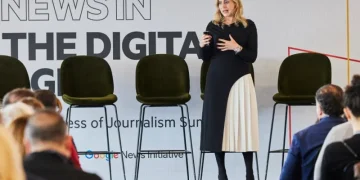THE next British astronaut to board the International Space Station is keen to go to the Moon, Mars and beyond – if assigned the mission.
Rosemary Coogan, 33, is expected to be sent to the orbital outpost sometime after 2026, once she has completed two more years of mission training.
![UK’s next ISS astronaut already has sights set on epic Mars voyage as Elon Musk plans Red Planet colony by 2050 ESA astronaut candidate Britain's Rosemary Coogan poses after a press conference of the European Space Agency (ESA) 2022 class of astronauts at the European Astronaut Centre (EAC) in Cologne, western Germany on May 3, 2023. - Five new ESA astronaut candidates took up duty at the European Astronaut Centre to be trained to the highest level of standards as specified by the International Space Station partners. (Photo by Ina FASSBENDER / AFP) / "The erroneous mention[s] appearing in the metadata of this photo by Ina FASSBENDER has been modified in AFP systems in the following manner: [Britain's Rosemary Coogan] instead of [Sophie Adenot from France]. Please immediately remove the erroneous mention[s] from all your online services and delete it (them) from your servers. If you have been authorized by AFP to distribute it (them) to third parties, please ensure that the same actions are carried out by them. Failure to promptly comply with these instructions will entail liability on your part for any continued or post notification usage. Therefore we thank you very much for all your attention and prompt action. We are sorry for the inconvenience this notification may cause and remain at your disposal for any further information you may require." (Photo by INA FASSBENDER/AFP via Getty Images)](https://www.thesun.co.uk/wp-content/uploads/2024/07/GettyImages-1252557819jpg-JS873139024-1.jpg?strip=all&w=960)

Coogan graduated from her European Space Agency (ESA) training in April of this year, when she was hailed “among the best” in her class of astronauts.
Asked if she would ever join Elon Musk and other partners to the Moon, Mars and beyond, Coogan told The Sun: “Yeah, absolutely.
“We are already going back to the Moon. The Artemis missions have started and the European service module is actually powering the Orion spacecraft that is taking astronauts back to the Moon.
“We’ve had a really successful Artemis 1 [mission] which was uncrewed and the Artemis 2 is due to be flying in the next year or so.
“I know that my focus now is to go to the International Space Station, but beyond that, Europe is going back to the Moon and of course one day to Mars with everything we’ve learned from the Moon as well.”
Nasa’s Artemis 2, the first crewed mission to the Moon in more than 50 years, is currently scheduled to launch in September 2025.
Plans to build permanent habitation on the Moon will be a critical stepping stone in getting humans to Mars.
Astro-entrepreneur and founder of SpaceX, Musk, hopes to set up a sustainable human colony on the Red Planet by 2050 – with flights beginning as early as 2029 aboard his next-gen Starship rocket.
Coogan’s ambition is an embodiment of the UK government’s efforts to carve an in-road in the global space industry.
Last year, the UK Space Agency inked a deal with Axiom Space to plan an all-Brit off-planet mission, headed by astronaut Tim Peake.
Though the UK’s new secretary of state for science and technology, Peter Kyle, has remained tight-lipped regarding the mission’s progress.
Kyle, who was appointed the role at the beginning of the month, told The Sun: “Because of the nature of the launch and the circumstances that surround a launch, it means it’s very hard to plan [a timeline].
“All I can say is that I’m as excited about it as the rest of the country is.”
Because of the economic straits our country is in, we can’t just do business as usual, we’re gonna have to innovate our way out of the challenges our country faces
Peter Kyle, UK secretary of state for science and technology
Kyle, the MP for Hove and Portslade, said the potential success of an all-Brit mission “fires every single patriotic gene in my body because it’ll be a huge moment of national pride and it’ll be a moment where I think we can excite the nation again over science”.
And Coogan, who dreamt of space as a child before becoming an astrophysicist-turned-astronaut, “represents” this “amazing future”.
He likens the moment to the US’ Apollo 7, Nasa’s first crewed flight in the Apollo programme.
“Nobody thought Apollo 7 would start spawning all these different industries, all these different technologies that many of us take for granted now, that were never intended to be part of the mission but have come out of it,” said Kyle.
The Apollo programme is largely considered to have birthed smartphones and the personal computer, thanks to Nasa’s efforts to miniaturise technology.
It’s this do-or-die attitude that Kyle believes can lift the UK’s economy into brighter pastures.
“Because of the economic straits our country is in, we can’t just do business as usual, we’re gonna have to innovate our way out of the challenges our country faces,” he concluded.
“We’ve got this new opportunity now, and for Britain to be in the driving seat of it.”
All you need to know about planets in our solar system
Our solar system is made up of nine planets with Earth the third closest to the Sun. But each planet has its own quirks, so find out more about them all…
- How old is Earth? Plus other facts on our planet
- How many moons does Mercury have?
- What colour is Venus?
- How far away is Mars to Earth? And other facts on the red planet
- How big is Jupiter?
- How many moons does Saturn have?
- Does Uranus have rings?
- How many moons does Neptune have?
- How big is Pluto?
- How hot is the Sun?




























